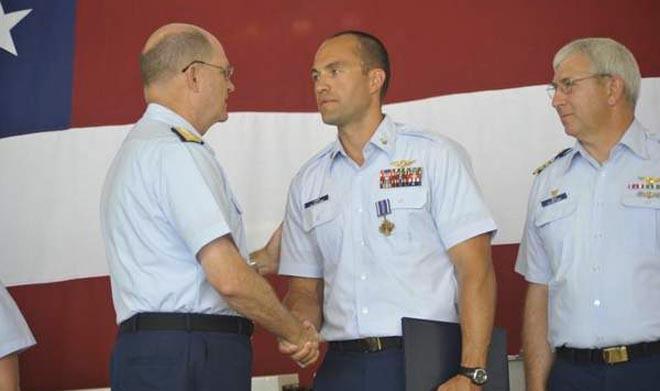HMS Bounty rescue swimmers honoured, tell the story
by Antonieta Rico, Navy Times/Sail-World Cruising on 15 Jul 2013

Recognition for heroism - HMS Bounty SW
Along with most other leisure sailors, we at Sail-World are always happy to see the brave exploits of those who go to rescue sailors in trouble recognised. Here the heroes of the rescue of the crew of HMS Bounty during Hurricane Sandy are honoured, and have their story told:
Rescue swimmer Randy Haba was standing duty Oct. 28 at Coast Guard Air Station Elizabeth City, N.C. It had been four days since Hurricane Sandy made landfall in Jamaica. People up and down the East Coast were hunkered down in advance of the storm, and the aviation survival technician second class didn’t anticipate a busy shift.
But about 80 nautical miles east of Cape Hatteras, N.C., the HMS Bounty was caught in the storm and slowly sinking.
The Coast Guard initially hoped to wait until morning to rescue the tall ship’s crew, Haba said, but the Bounty was falling apart. So, in the early morning of Oct. 29, Haba put on hisdry suit and boarded a helo.
'We took off and went straight into the clouds,' Haba said.
A second helicopter would join efforts soon after, with AST3 Daniel Todd on board.
Haba and Todd would rescue a total of 14 of the Bounty’s 16 crew members over a few hours, actions that earned each of them a Distinguished Flying Cross, presented June 26 in Portsmouth, Va. Twenty-three other Coast Guardsmen were also recognized for the rescue.
The Bounty left Oct. 25 from New London, Conn., bound for St. Petersburg, Fla. Its captain, Robin Walbridge, reportedly believed he could sail around the storm.
It was still dark when the first helo took off from Elizabeth City; with the heavy rain and wind, the crew was flying by instruments, Haba said. After 90 minutes or so they descended through the cloud cover, about 200 to 250 feet above the water, to get eyes on the ocean.
They spotted strobes and checked each one for survivors. They found one Bounty crew member floating in the roiling ocean. Haba was lowered into the water below, where 30-foot waves pounded against him and kept him from reaching the crew member, he said. In his third attempt he finally got to the man, fastening a strap around his chest. The helo lifted them up.
But there were 15 more people in the ocean. After not finding anyone in the rest of the strobe lights, the helo took Haba near a life raft. Haba disconnected from his line and went into the ocean. In a separate helo, Todd was lowered into the ocean to go after Bounty crew members floating in a second raft.
The swimmers braved gale-force winds and swells from all directions, Todd said.
'It was like [being inside] a washing machine,' he added.
When he got to the raft, Todd found six crew members and started putting them in a rescue basket, one by one. Waves would flip him in a somersault as he swam. After rescuing two crew members, a wave flipped the entire raft over.
The remaining four escaped the raft’s smothering canopy, yet still held on. All were rescued.
At the other raft, Haba had seven people to save. He took the weakest first, a man who Haba described as in his 60s and who appeared seasick. Using a cross-chest carry, Haba swam the man back near the helo and signaled for the hoist. He did that three more times, at one point getting his mask and snorkel knocked off by a wave.
After he put a fourth person from the raft into the helicopter, the Coast Guard crew lowered the hook for him. He hooked himself up, thinking the helo was taxiing him to the raft to rescue the last three. Instead, he was pulled up. The helicopter was running out of fuel and needed to take the survivors back to the air station.
'I told them I wanted to go back down' and stay until the next helo came, Haba said. But his fellow Coasties told him the other helo could take over.
Todd had just rescued the six people aboard the second raft. He was tired and feeling a little sick from swallowing sea water, he said. He was mentally ready for the ride home when he was told the other helo was running out of fuel. Could he go back to rescue the final three people from the other raft?
'It took me one split second,' Todd said, thinking to himself, 'As long as the [helo] has gas, I’m going to have gas.'
And he went back into the ocean. In all, he saved nine people.
Another C-130 kept searching for the last two crew members missing from the Bounty. Claudene Christian was hoisted by a third helo crew, but did not survive. Walbridge was never found.
Todd said that he thinks of his award as representing all the people who do rescues. 'It’s a team effort to go out there,' he said.
Both men said they didn’t jump into the ocean to earn recognition or awards — they were just doing their jobs.
'I’m just happy to help out,' Haba said simply. 'That’s about it.'
If you want to link to this article then please use this URL: www.sail-world.com/111950